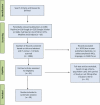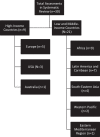A systematic review of the use of adolescent mystery clients in assessing the adolescent friendliness of health services in high, middle, and low-income countries
- PMID: 30482103
- PMCID: PMC6282470
- DOI: 10.1080/16549716.2018.1536412
A systematic review of the use of adolescent mystery clients in assessing the adolescent friendliness of health services in high, middle, and low-income countries
Abstract
Background: Mystery client methodology is a form of participatory research that provides a unique opportunity to monitor and evaluate the performance of health care providers or health facilities from the perspective of the service user. However, there are no systematic reviews that analyse the use of mystery clients in adolescent sexual and reproductive health (ASRH) research and monitoring and evaluation of programmes.
Objective: To assess the use of adolescent mystery clients in examining health care provider and facility performance in providing ASRH services in high, middle, and low-income countries.
Methods: We carried out a systematic review of published journal articles and reports from the grey literature on this topic from 2000 to 2017 (inclusive). Thirty research evaluations/studies were identified and included in the analysis. We identified common themes through thematic analysis.
Results: The findings reveal that researchers and evaluators used mystery client methodology to observe client-provider relationships, and to reduce observation bias, in government or private health facilities, NGOs, and pharmacies. The mystery clients in the evaluations/studies were young people who played varying roles; in most cases, they were trained for these roles. Most reported good experiences and friendly providers; however, some reported lack of privacy and confidentiality, lack of sufficient written/verbal information, and unfavourable experiences such as sexual harassment and judgmental comments. Female mystery clients were more likely than males to report unfavourable experiences. Generally, the methodology was considered useful in monitoring and evaluating the attitudes of health service providers and ASRH service provision.
Conclusions: The research evaluations/studies in this review highlight the usefulness of mystery clients as a method to gain insight, from an adolescent perspective, on the quality of ASRH services for research and monitoring and evaluation of programmes.
Keywords: Youth friendly services; adolescent sexual and reproductive health; participatory research methods.
Figures
Similar articles
-
Strategies for Optimal Implementation of Simulated Clients for Measuring Quality of Care in Low- and Middle-Income Countries.Glob Health Sci Pract. 2017 Mar 28;5(1):108-114. doi: 10.9745/GHSP-D-16-00266. Print 2017 Mar 24. Glob Health Sci Pract. 2017. PMID: 28126970 Free PMC article.
-
Indigenous perceptions and quality of care of family planning services in Haiti.Health Policy Plan. 1994 Sep;9(3):306-17. doi: 10.1093/heapol/9.3.306. Health Policy Plan. 1994. PMID: 10137743
-
Quality of youth friendly sexual and reproductive health Services in West Gojjam Zone, north West Ethiopia: with special reference to the application of the Donabedian model.BMC Health Serv Res. 2020 Mar 24;20(1):245. doi: 10.1186/s12913-020-05113-9. BMC Health Serv Res. 2020. PMID: 32209071 Free PMC article.
-
The study of client-provider interactions: a review of methodological issues.Stud Fam Plann. 1994 Jan-Feb;25(1):1-17. Stud Fam Plann. 1994. PMID: 8209391 Review.
-
Provision and uptake of routine antenatal services: a qualitative evidence synthesis.Cochrane Database Syst Rev. 2019 Jun 12;6(6):CD012392. doi: 10.1002/14651858.CD012392.pub2. Cochrane Database Syst Rev. 2019. PMID: 31194903 Free PMC article.
Cited by
-
Implementation Strategies to Enhance Youth-Friendly Sexual and Reproductive Health Services in Sub-Saharan Africa: A Systematic Review.Front Reprod Health. 2021 Aug 4;3:684081. doi: 10.3389/frph.2021.684081. eCollection 2021. Front Reprod Health. 2021. PMID: 36304027 Free PMC article.
-
Repurposing NGO data for better research outcomes: a scoping review of the use and secondary analysis of NGO data in health policy and systems research.Health Res Policy Syst. 2020 Jun 8;18(1):63. doi: 10.1186/s12961-020-00577-x. Health Res Policy Syst. 2020. PMID: 32513183 Free PMC article.
-
Sexual and reproductive health among adolescents in vulnerable contexts in Mexico: Needs, knowledge, and rights.PLOS Glob Public Health. 2023 Nov 1;3(11):e0002396. doi: 10.1371/journal.pgph.0002396. eCollection 2023. PLOS Glob Public Health. 2023. PMID: 37910453 Free PMC article.
-
Exploring opportunities to enhance the quality of pharmacy-based contraceptive service delivery for adolescents and young women in Kenya: a multimethod qualitative study.BMC Health Serv Res. 2025 Jun 3;25(1):790. doi: 10.1186/s12913-025-12933-0. BMC Health Serv Res. 2025. PMID: 40462034 Free PMC article.
-
Assessment of the quality of sexual and reproductive health services delivered to adolescents at Ujala clinics: A qualitative study in Rajasthan, India.PLoS One. 2022 Jan 10;17(1):e0261757. doi: 10.1371/journal.pone.0261757. eCollection 2022. PLoS One. 2022. PMID: 35007310 Free PMC article. Clinical Trial.
References
-
- Marie Stopes International Monitoring quality of care through mystery client surveys: guidelines. Marie Stopes International. 2016. Available from: http://m4mgmt.org/wp-content/uploads/2016/06/quality-Monitoring-Quality-...
-
- Huntington D, Lettenmaier C, Obeng-Quaidoo I.. User’s perspective of counseling training in Ghana: the “mystery client” trial. TT - Stud Fam Plann. 1990;21:171–20. - PubMed
-
- Maynard-Tucker G. Indigenous perceptions and quality of care of family planning services in Haiti. Health Policy Plan. 1994;9:306–317. - PubMed
-
- Gonsalves L, Hindin MJ. Pharmacy provision of sexual and reproductive health commodities to young people: a systematic literature review and synthesis of the evidence. Contraception. 2017;95:339–363. - PubMed
-
- Bate R, Mooney L, Hess K. Medicine registration and medicine quality: a preliminary analysis of key cities in emerging markets. Res Rep Trop Med. 2010;1:89–93. Available from http://ssrn.com/abstract=2341961
Publication types
MeSH terms
Grants and funding
LinkOut - more resources
Full Text Sources
Medical


